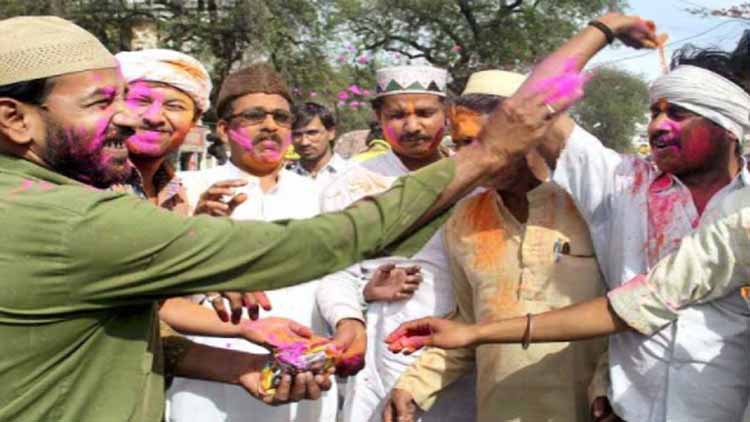
Zahid Khan
In India, all the festivals are celebrated by people of all religions and faiths. We do participate in each other's festivals with enthusiasm. But among all the Indian festivals, Holi is the most keenly awaited festival by all and it serves to bond people of different religions.
Minority communities like Muslims, Christians also celebrate Holi with fervor. Be it a common man or the special Holi festivities of the rich and the influential, it’s played with unmatched enthusiasm by all.
It was during the Mughal period that Hindu and Muslim festivals started celebrating each other's festivals. The Mughal rulers gave state recognition to the Holi festival. In those times, Holi celebrations stretched over many days in the Mughal court.
Amir Umrao also used to participate in Holi with the general public of the state. The Mughal emperor not only played Holi enthusiastically but also encouraged his Hindu queens from playing with colours on the day.
The festival of Holi was celebrated with color and enthusiasm under the rule of the Mughal emperor Aurangzeb, who is otherwise seen as a religious fundamentalist. In this festival, Muslim nobles along with their Hindu brothers used to participate openly.
Aurangzeb's biographer Bhimsen has mentioned in his book, During the reign of Aurangzeb, Khan Jahan Bahadur Kotlashah, Raja Subban Singh, Rai Singh Rathore, Rai Anoop Singh, and Mokham Singh Chandrawat enjoyed the festival of colors.
“Khan Bahadur's sons Mir Ahsan and Mir Muhsin used to be more enthusiastic than Rajputs while playing Holi." Members of Aurangzeb's family used to participate in Holi celebrations with gusto despite their displeasure. The book Haft Tamasha by Mirza Qateel written around the eighteenth century has an important comment on the Holi festival. The author of the book says, “All Muslims used to play Holi except the Afghans and some misogynists. Even a small person used to put color on the biggest of the elite, so he did not feel bad about him.”
Not only in the Mughal Empire, but also Bengal, the Muslim Nawabs Murshid Quli Khan, Ali Vardi, Sirajuddaula, and Mir Jafar used to celebrate the festival of Holi with great pomp. It is mentioned in the history books that Ali Vardi's nephews Shahmat Jung and Sablat Jung also once celebrated Holi for seven consecutive days in the garden of Moti Jheel where colored water and heaps of abir and saffron were prepared to celebrate the festival.
The Nawabs of Awadh played Holi and also participated in all other festivals celebrated by the common people. The courts of Nawab would be decorated for the festival of Holi gatherings. The preparations would start much in advance.
The British historians and fanatics in both the communities had never liked the Hindu-Muslim unity. These historians distorted the accounts of the history and tried to create a wedge between Hindus and Muslims.
Not only was the liberal outlook of the Muslim rulers of the Holi festival alone, but the Urdu language was also greatly influenced by this festival. This is the reason why a lot has been written on Holi in the Urdu language than on other festivals.
Holi has been a favorite festival of poets. one finds many such compositions of Urdu poets, in which all the colors of Holi and the gaiety of the festival have been highlighted. Many great poets like Mir, Quli Qutbshah, Faiz Dehlvi, Nazir Akbarwadi, Mahjoor, and Atish have written many brilliant compositions on Holi. Usually, among the poets of North India, everyone’s poetry is incomplete without the splash of the colour of Holi.
